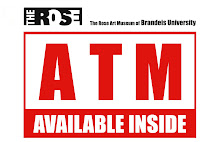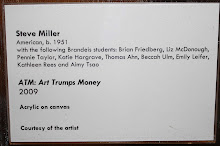While Brandeis University Provost Marty Krauss claims in an April 17, 2009 letter to the Brandeis Board of Trustees that the “Rose Art Museum will remain a museum,” the University continues to take steps to dismantle the beloved institution, according to the Rose Art Museum Board of Overseers.
In her letter, Krauss attempted to clarify future plans for the Rose Art Museum once the University closes it on June 30, 2009. Despite the existence of the current Board of Overseers for the museum, Brandeis has named a new committee to “explore future options for the Rose.” In addition, the current position of museum director will be eliminated. According to Jon Lee, chair of the Rose Art Museum’s Board of Overseers, “Without a director or curator, the Rose cannot continue to function as a museum under any meaningful definition. Since the University’s announcement on January 26, 2009 that it would close the museum, membership and Rose Overseer dues, and all donations have ceased or been asked to be returned. This amounts to more than $2.5 million.”
“When the Rose family originally founded the Rose Art Museum, they were very clear about its mission and the integral role it would play as a part of the Brandeis community,” said Meryl Rose, a member of the Rose Art Museum’s Board of Overseers and a relative to the original museum founders. “A museum with a collection and reputation such as the Rose needs a director, and while Krauss’s letter states that the collection will be cared for, it does not erase the fact that the Rose as we know it will cease to exist under the administration’s current plans. The administration is carrying out an elaborate charade, the first step of which is to turn the Rose from a true museum as its founders intended, into something quite different.”
Two months after first announcing and then restating its intentions to close the Rose and sell off the artwork, the University released the mandate for its “Committee for the Future of the Rose.” The group was established by Brandeis in the wake of its announcement that the Rose Art Museum would be closed and the Museum’s art collection─valued at approximately $350 million─would be sold to defray the University’s operating expenses.
According to Brandeis, the committee is designed to “explore options” for the future of the Rose, but is specifically prohibited from determining the fate of the works of art that are the heart of the institution, leaving that to the administration and Brandeis Board of Trustees. Although the committee includes representatives from various constituencies, including the Rose Art Museum Board of Overseers, members were hand-picked by the administration and the Rose was not allowed to choose its own representative.
“By forming the committee, Brandeis has turned a blind eye to the fact that the Rose already had an active board, in the Rose Art Museum Board of Overseers, to map out its future,” said Rose. “For decades, the museum has also had in place highly acclaimed programming and a dedicated staff to oversee its priceless collection.”
“What is also terribly saddening to us,” continued Rose, “is the role the Brandeis Board of Trustees played in this matter. We know that the trustees have only the best interests of the University at heart. They care about the arts, as many of them sit on the boards of prestigious arts institutions. Unfortunately, they have been led astray by a disingenuous administration motivated to push an agenda that involves looting the school’s culture to simply balance the books. Brandeis is devoted to ‘Truth, even unto its innermost parts,’ but their actions, which always speak louder than words, are designed to do just the opposite, to hide true motives behind bureaucracy, highly paid Boston PR consultants and eventually to the end of a renowned and respected collection that can never be reassembled.”
Timeline
“In January, the Brandeis Board of Trustees unanimously approved a proposal set before them by President Reinharz that called for the museum to be closed and the artwork sold off, ostensibly to meet a financial shortfall,” said Rose. “The intense negative public response prompted President Reinharz to undertake a series of public moves designed to quiet the anger while still moving forward with the overall plan.”
“As a museum of modern and contemporary art, a code of ethics in the arts community dictates that the Rose Art Museum cannot sell off art that is core to its mission,” continued Rose. “The University is taking steps to turn the museum into an arts center, which is entirely different from a museum. By making that one change the current collection would not fall under the same rules and codes of ethics, freeing the University to sell the art in two years. So the actions set in place by the administration today will lead directly to the sale of the artwork in 2011.”
“We can’t let this happen, we won’t let this happen,” said Rose. “Louis Brandeis understood the importance of art as part of a strong university. He wrote to his daughter to establish a strong collection as she built the University of Louisville. To think that the school that bears his name will lose its own art collection goes beyond words.”
About the Rose Art Museum
Located on the campus of Brandeis University in Waltham, Mass., The Rose Art Museum was founded in 1961. Over the past 40 years The Rose has earned a considerable reputation for its collections and exhibitions. The collection contains significant holdings in post-War American art including iconic works by Jasper Johns, Robert Rauschenberg, Willem DeKooning, Roy Lichtenstein, Andy Warhol and numerous others.
Subscribe to:
Post Comments (Atom)




No comments:
Post a Comment